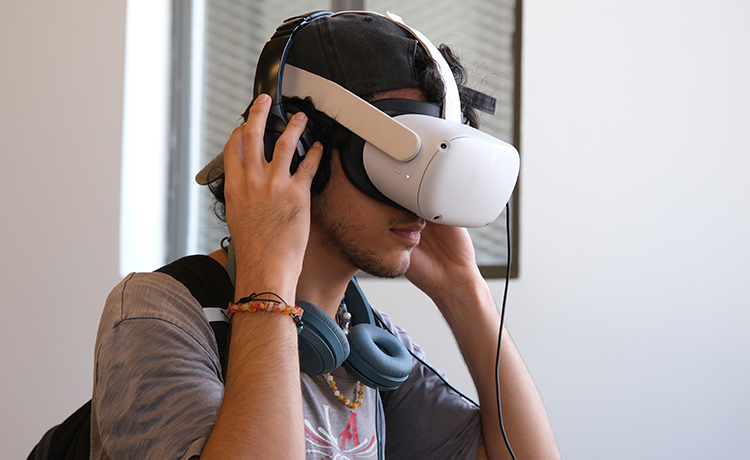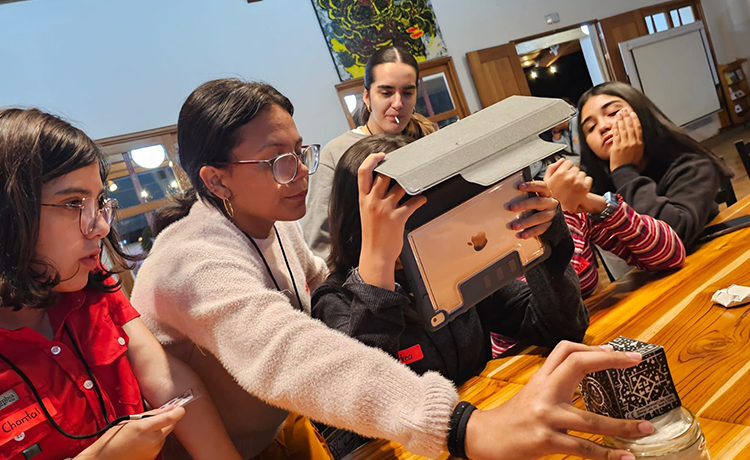News
One year on, Joint Innovation Challenge winners keep up the fight against gender-based violence
- 25 January 2024
News
UNITED NATIONS, New York – Ending gender-based violence will take commitment, compassion and, as demonstrated by the winners of the 2022 Joint Innovation Challenge, resourcefulness and creativity too.
In March 2022, UNFPA, the United Nations sexual and reproductive health agency, in partnership with the World Intellectual Property Organization, the International Telecommunication Union and the International Trade Centre launched the Innovations to Empower Women and Girls challenge. The initiative supports social enterprises led or co-led by women and that provide creative solutions in the areas of maternal health, sexual and reproductive health, and gender-based violence. From a total of 300 submissions in 61 countries, 10 winners were chosen to receive funding and technical mentorship.
One year on, three challenge winners whose projects address gender-based violence in their communities told UNFPA how they are more committed than ever to the cause.

KizBasina/MecRa, Türkiye
Harnessing the power of new technology, KizBasina/MecRa developed an immersive augmented reality experience that replicates dangerous situations that women experience in real life. The Empathy Immersive AR project aims to increase understanding for girls and women by evoking the real emotions they experience in various daily scenarios, such as walking alone at night on a deserted street. Another virtual reality experience, inspired by the true story of a woman named Sema, demonstrates the reality of life for women living in remote regions of Türkiye and who were married as adolescents. While such scenes are familiar to many women, the emotions they elicit can be difficult for men and boys to grasp.
“Our inspiration stemmed from a deep sense of responsibility to address the gaps in sexual and reproductive health and rights in Türkiye,” said Ceren Erol, a coordinator for the project. “Witnessing the disparities in understanding, access and awareness, we felt compelled to contribute to positive change.”
KizBasina/MecRa produced three immersive videos to raise awareness of gender-based violence, while various in-person events in eastern Anatolia offered the general public the opportunity to participate in the full virtual reality experience. One event in Istanbul paired the experience with an art exhibition, thereby introducing the issue of gender-based violence to a wider audience.
During the nine-month pilot phase, over 35,000 people of all ages participated in the experience. Tests from before and after showed that the project succeeded in significantly increasing empathy for survivors, especially among older men.
When asked if they plan to continue working on such issues in the future, Ceren had no doubt: “Our commitment to fighting gender-based violence is unwavering. It's a cause that demands ongoing dedication, and we are motivated to contribute to sustained positive change.”

Fundación PANIAMOR, Costa Rica
Mariam Carpio, programme director at Fundación Paniamor, a local NGO for young people’s rights in Costa Rica, is passionate about finding safe ways to use technology.
“The internet is where children try to figure out who they are, and they have to deal with a lot of attention and pressure from others,” she told UNFPA. “Understanding how they are living with technology, recognizing their diversity, and listening to what they have to say are some of the lessons I have learned from working face-to-face [with children]. It’s a mistake to design projects thinking that they will live like we do.”
With this in mind, the Paniamor team used the investment they received as challenge winners to scale up their e-learning toolbox, called “He loves me a lot, a little or not at all” (Me Quiere No Me Quiere). From June to December 2023, the platform reached more than 3,000 girls, helping them to identify signs of gender-based violence and abuse in relationships and giving advice on how to end the relationship if it becomes dangerous or uncomfortable. Where a high risk of violence is detected, the platform alerts the user with a red flag and provides contact information for local health services to reach out to.
While such technology offers new opportunities, Ms Carpio said she is aware of the risks they pose too. “They have the potential to cause irreparable harm to children [...] simply for being female. Without a grasp of the newest online platforms, users are drawn to viral content, and the anonymous nature of the internet is an added temptation for people as they can disregard boundaries.”
To ensure the sensitivity of the platform, seven officials from the ministry of public education and the department of health and environment were asked to vet the content. Children were also involved in developing the toolbox, with 60 boys and girls validating content and 30 participating in trials to ensure its relevance and accessibility.
“My work will continue to take a child rights and intersectional gender approach, which means that I need to consider the specific risks of gender-diverse people and girls’ varying life contexts and evolving capacities,'' Ms Carpio said. “If we want to help young people and keep them safe in tough situations, we need all the evidence and analysis we can find.”
Safe YOU, Armenia
For Mariam Torosyan, CEO and founder of the Safe YOU app, it was her studies in human rights and public health that inspired her to begin working on gender-based violence in her community.
“During my work in these fields, I saw a critical gap in the support systems available for survivors,” explained Ms Torosyan. “Witnessing the complexities of gender-based violence, the societal stigmas, and the lack of coordinated efforts to tackle the root causes, I saw an opportunity to create a tool that could make a lasting impact.”
Safe YOU is a virtual safe space for women, an app that provides free remote consultations and educational resources. There is also an emergency help function that allows users to record or type a message to selected family, friends, professional service providers or the police should they feel they are in danger.
To prioritize the safety of its users, the platform uses a specific analytics system to collect non-identifiable data and send anonymous reports to government officials to inform policy. By the end of 2022, the application had over 25,000 users across Armenia, Georgia and Iraq. Thus far, more than 14,000 women have reported cases of gender-based violence through the platform and over 8,000 women have accessed help through its network of psychologists, lawyers and health-care workers.
While the project has already seen impressive results, Ms Torosyan only intends to build on this success. “The intersection of creativity and technology can address pressing issues in novel ways, which inspired me to continue strengthening our innovative solution and make it more accessible."